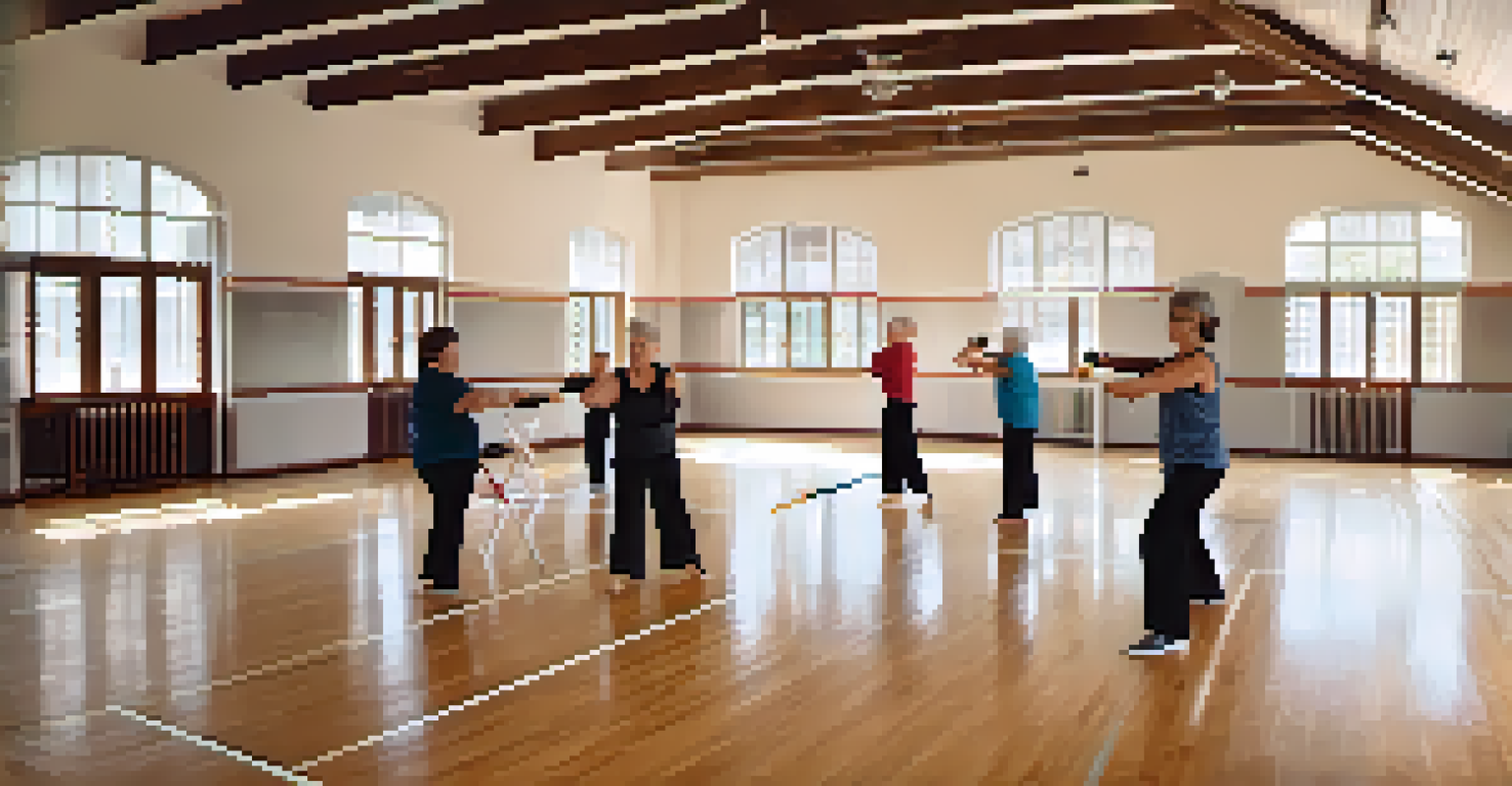Essential Self Defense Techniques for Seniors to Stay Safe

Understanding the Importance of Self-Defense for Seniors
Self-defense is not just for the young and athletic; it's crucial for seniors too. As we age, our physical abilities may change, making us more vulnerable to attacks. Understanding self-defense techniques can provide seniors with confidence and a sense of security, empowering them to protect themselves in various situations.
An ounce of prevention is worth a pound of cure.
Many seniors live independently, and with that independence comes the responsibility of personal safety. Knowing basic self-defense can help them feel safer in their neighborhoods and during outings. Additionally, self-defense training can foster social connections and engage seniors in a supportive community.
Ultimately, self-defense is about awareness and preparedness. By learning how to protect themselves, seniors can navigate the world more confidently, ensuring that they feel in control of their own safety. This proactive approach can greatly enhance their quality of life.
Situational Awareness: The First Line of Defense
Situational awareness means being conscious of your surroundings and recognizing potential threats. For seniors, this skill is vital, as it helps them avoid dangerous situations before they escalate. Simple practices like scanning the area for suspicious activity or staying alert while walking can make a significant difference.

One effective way to improve situational awareness is by practicing mindfulness. Being present in the moment allows seniors to notice details they might otherwise overlook, such as unusual behavior or potential hazards. This heightened awareness acts as an early warning system, helping seniors stay one step ahead.
Self-Defense Empowers Seniors
Understanding self-defense techniques boosts seniors' confidence and personal safety.
Moreover, seniors should trust their instincts. If something feels off, it's better to err on the side of caution. By developing a keen sense of awareness, seniors can make informed decisions about when to engage, escape, or seek help.
Basic Physical Techniques for Self-Defense
While seniors may not have the strength of their youth, simple physical techniques can be highly effective. Techniques such as using an open hand to push away an aggressor or leveraging body weight to escape a grip can provide a crucial advantage. These moves focus on using technique over strength, making them accessible for all ages.
The best way to predict the future is to create it.
When practicing self-defense, seniors should focus on moves that are easy to remember and execute. For instance, learning to create distance by stepping back or turning sideways can help them evade an attacker. These small adjustments can significantly increase their chances of escaping a potentially harmful situation.
Regular practice is key to retaining these techniques. Engaging in self-defense classes or working with a partner can help reinforce these skills, ensuring that seniors feel more comfortable and confident when faced with a real threat.
Verbal Techniques: The Power of Communication
Often, the best defense is a strong voice. Seniors can use verbal techniques to de-escalate situations or attract attention. Simple phrases like 'Leave me alone!' or 'Back off!' can surprise an attacker and buy precious time to escape.
Additionally, cultivating assertiveness is crucial. Seniors should practice speaking confidently and clearly, which can deter potential threats. The more assertive they are, the less likely they may appear as easy targets.
Awareness is Key to Safety
Practicing situational awareness helps seniors avoid potential threats before they escalate.
Role-playing scenarios can be a fun and beneficial way for seniors to practice these verbal techniques. By simulating different situations, they can become more comfortable using their voice effectively when needed.
Using Everyday Items as Self-Defense Tools
Seniors can utilize everyday items as self-defense tools to enhance their safety. For example, a cane can be used to create distance or block an attacker, while a keychain can serve as a makeshift weapon if necessary. Recognizing the potential of common items can empower seniors to feel more equipped.
In addition to physical items, seniors should consider personal safety devices like whistles or pepper spray. These tools can be easily carried and can effectively alert others or deter an attacker when used properly. It's essential to know how to use them effectively and practice beforehand.
The key is to think creatively about self-defense. By viewing ordinary objects through a different lens, seniors can enhance their self-defense strategy and feel more confident in their ability to protect themselves.
The Importance of Self-Defense Training Classes
Participating in self-defense training classes offers many benefits for seniors. These classes not only teach practical techniques but also provide a supportive environment to build confidence and camaraderie among participants. Learning alongside peers can make the experience more enjoyable and less intimidating.
Many community centers and local organizations offer self-defense classes specifically tailored for seniors. These classes often focus on age-appropriate techniques and strategies, ensuring that participants feel comfortable and safe. Attending such classes can also foster a sense of community and connection.
Training Classes Foster Community
Self-defense training classes not only teach practical skills but also create a supportive environment for seniors.
Moreover, regular training helps reinforce skills and keeps them fresh in participants' minds. The more seniors practice, the more instinctive their responses will become, leading to greater confidence in their ability to defend themselves.
Creating a Personal Safety Plan
A personal safety plan is an essential tool for seniors to navigate their environment with confidence. This plan can include strategies for safe travel, emergency contacts, and steps to take if they feel threatened. By having a plan in place, seniors can avoid panic during a crisis and respond more effectively.
Seniors should also consider their daily routines and identify any vulnerable areas or times when they may feel unsafe. For example, walking alone at night may be riskier, and planning alternative routes or times can enhance safety. A proactive approach is key to staying safe.

Involving family members in these discussions can also be beneficial. Engaging loved ones in the creation of a safety plan fosters open communication and ensures everyone is on the same page, providing additional peace of mind.
Staying Informed About Local Safety Resources
Staying informed about local safety resources can significantly enhance a senior's sense of security. Many communities offer programs, workshops, and resources aimed at empowering seniors to stay safe. By actively seeking out these opportunities, seniors can gain valuable knowledge and skills.
Local law enforcement agencies often host safety seminars, where seniors can learn about current trends in crime and effective prevention strategies. Connecting with neighborhood watch groups can also foster a sense of community and shared responsibility for safety.
Additionally, staying in touch with neighbors and building a supportive network can be incredibly beneficial. When seniors know they have people looking out for them, it creates a safer environment and encourages a sense of belonging.